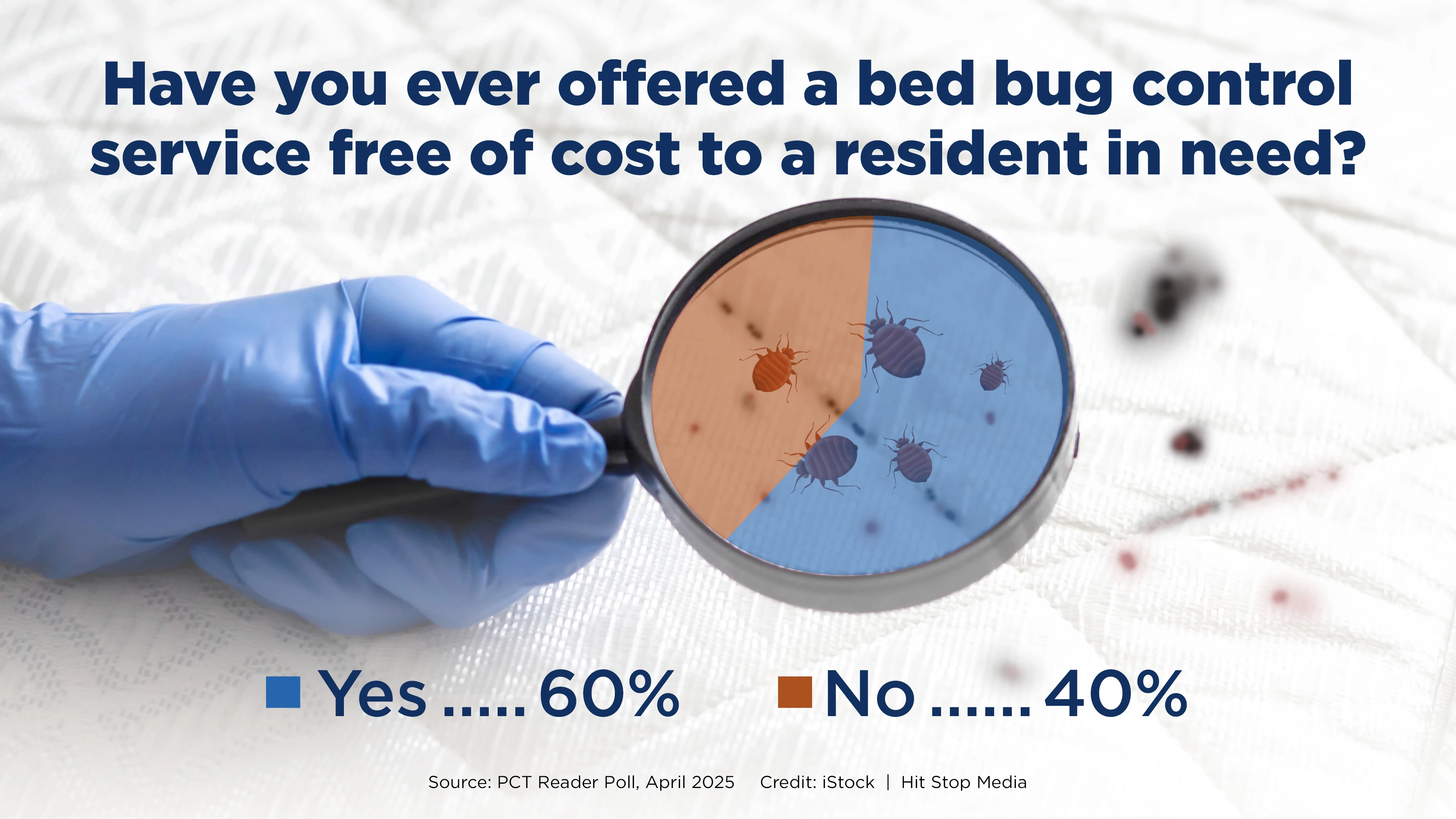
For some, the news of a readily available vaccine seemed like the long-awaited solution to the havoc the COVID-19 pandemic has unleashed on today’s world. But the divisive, politically charged conversation surrounding vaccination has created a whole new set of problems, including some specific to the pest control industry. Select commercial clients, especially food-processing plants, hospitals and assisted-living facilities, are requiring that all technicians who enter their premises be vaccinated against COVID-19. Meanwhile, employers’ worries are increasing regarding unvaccinated employees and the health threats the Delta variant poses for team members, customers and the larger community.
To provide insight into some of the measures pest control companies are taking to address this issue, the National Pest Management Association (NPMA) hosted the webinar “Navigating the Challenges of Employee Vaccinations” on Aug. 31. Jim Fredericks, vice president of technical and regulatory affairs, NPMA, served as moderator, with speakers Kylie Luff, senior vice president and managing partner of Seay Management Consultants, Orlando, Fla.; Bobby Jenkins, owner of ABC Home & Commercial Services, Austin, Texas; Ross Treleven, president of Sprague Pest Solutions, Tacoma, Wash.; and John Myers, president and CEO of Rentokil North America, Reading, Pa.
OFFICE POLICIES. Luff, whose firm has been advising companies about vaccination policies and COVID-19 best practices, said that at first, most employers were reluctant to implement a company-wide policy regarding vaccination. However, as the Delta variant becomes more widespread, this attitude is changing.
“Employers are beginning to create and set policies for employee safety, and some are choosing to implement policy differently for their vaccinated team members versus their unvaccinated team members,” said Luff.
Examples include mandatory temperature checks, elimination of business travel, mask requirements and remote work for unvaccinated employees.
Applying policy differently to different groups of employees, i.e., vaccinated versus unvaccinated, can create HR concerns, said Luff. So much surrounding COVID-19 is unprecedented, leaving companies to face the unknown without clear answers as to how to approach the situation.
“The question still remains: how much liability can these policies create for employers in the long run?” Luff asked. “This question is still unknown in terms of having different requirements for different groups of employees. We’re always trying to advise clients to apply their policies consistently and fairly.”
To avoid HR snafus, some companies are developing universal policies for all employees, Luff said. Mandatory vaccination policies have become more common in workplaces over the summer, with the FDA approval of the Pfizer vaccine playing a large role in that decision. “Many employers are hoping this approval will help ease concern from employees about receiving the vaccine,” Luff said.
Research from law firm Littler Mendelson showed the number of employers currently mandating vaccination has doubled from 10 percent in January to 21 percent in August.
However, employer concerns remain. Company leaders are still experiencing resistance from employees who are either afraid or unwilling to get vaccinated. Mandatory vaccination policies are negatively affecting employee morale, Luff said, and companies are experiencing staffing issues in an already impacted market.
Luff reminded employers that they must consider reasonable accommodations regarding religion, disability, health and pregnancy when applying a vaccine mandate, though the details on how to implement such accommodations are still fuzzy, as the U.S. Equal Employment Opportunity Commission has not provided much guidance on the subject, she said.
Employers also can choose to provide a small incentive to employees who do choose to get vaccinated, so long as that reward is not substantial enough that an employee would feel coerced or pressured to receive the vaccine, Luff said. “We are suggesting a gift card or a small bonus to employees who choose to get vaccinated,” she said.
Paid leave for COVID-19-related absences is not required on the federal level anymore, Luff said; however, some states have implemented legislation on required leave, including New York, New Jersey and California. Luff warned that misinformation is circulating regarding the topic; she encouraged those with state-specific questions to reach out to her firm for more information.
Whatever a company decides as its policy, Luff said it should ensure it is communicated clearly to employees. She recommended providing a designated point of contact within the workplace who is familiar with the policy and can respond to questions or concerns.

CLIENT MANDATES. Treleven explained that Sprague’s clients are all commercial, mostly in the food-processing and distribution markets. Currently, 381 of Sprague’s clients have vaccination mandates for technicians who service their accounts. The company has had to reroute technicians to accommodate these mandates.
“We have a lot of disruption to our operating team right now because of the vaccine,” Treleven said. “We’ve had significant pushback from the vaccine-hesitant. We have offices and departments that are 100 percent vaccinated, and we have offices that are 20 percent vaccinated. So, we have significant issues here with making sure that we have a workforce that can service all the places that need to be serviced.”
Treleven said other commercial customers have indicated that they have mandates in the works.
“We’re expecting to have significantly more mandates headed our way from our commercial customers, especially in food-processing, and in the hospital and assisted living sectors, which are very large customers of ours,” said Treleven.
At Rentokil, Myers said two to three percent of its commercial clients have vaccine mandates, either due to a state law or individual company policy. Some residential clients also request vaccinated service technicians. Rentokil’s human resources department is keeping employee vaccination records on file to respond to this demand.
“We felt that we had a fiduciary responsibility to our customers to literally prove that our colleagues had the vaccination,” Myers said. “Nothing would be worse than we just believe someone, perhaps they misled us, and as a result, someone got sick.”
EMPLOYEE RESISTANCE. Jenkins said vaccination is a controversy he didn’t see coming at ABC.
“I guess I just was of the mind that oh...we’ve got a vaccine that came in incredible time, and the data and the information is just overwhelmingly positive. Surely, everyone’s going to jump on this,” he said. “And obviously, that’s not the case. And I can testify that here at ABC, it’s definitely not the case.”
At the time of the webinar, just over 40 percent of Jenkins’ employees were vaccinated. “This is something I’m not happy about,” he said. His goal for the company is 70 percent vaccination status.
Sprague’s vaccination status is higher at 67 percent. However, the company has still received significant pushback from the vaccine-hesitant, Treleven said.
“There’s this angst about the vaccinations, and that’s hurting our company culture,” he said.
MEANS OF ENCOURAGEMENT. Jenkins said his focus has been finding creative ways to increase the number of people vaccinated at his company. He started by giving vaccinated employees red wristbands that indicated their vaccination status. Those with wristbands did not have to wear a mask in the office (that has since changed in the wake of the Delta variant, he said).
“It did provide some impetus for people to get vaccinated,” he said. It also allowed employees to more easily distance from those who were not vaccinated.
ABC hosted two group vaccination opportunities for employees on site. The company also has hosted six drawings for $500 gift cards out of a pool of its vaccinated employees.
“There’s a lot of people who are saying no, and they just need to be pushed, pulled, begged, pleaded with, to step over the line to get the vaccine,” Jenkins said. “I understand that there are people with medical reasons or religious reasons; I set them aside. But I do believe there’s a lot of people that have chosen not to get vaccinated because, well, they’re not going to be told what to do by the government.”
So far, ABC has “strongly, strongly, strongly encouraged” its employees to get the vaccine, Jenkins said, but he hasn’t made it mandatory, though he hasn’t ruled that out. He fears a mandate would cause a huge loss of his workforce. He’s also considered mandating that employees either be vaccinated or submit a weekly negative COVID-19 test, which he said he thinks would be less upsetting to employees.
Another option is, as Delta Airlines recently mandated, tacking an additional $100 charge on health insurance for employees who aren’t vaccinated. Treleven said Sprague has considered this policy.
Other options Jenkins has mused over include pay increases for vaccinated staff or a vaccine mandate for all new hires.
Sprague has instituted a policy that all new hires be vaccinated. Treleven said this has limited its candidate group by about 30 percent.
As more commercial accounts institute mandates, Sprague has told its vaccinated employees that they are more valuable because they can service more accounts. Employees who submit proof of vaccination receive a $1-an-hour raise.
“For us, this is a permanent investment in the fact that we need to service those customers,” Treleven said.
Rentokil has not implemented a mandate, but Myers said the company will continue to highlight the benefits of the vaccine. In the meantime, the company is requiring masks, social distancing and symptom monitoring and encouraging remote work when possible.
“It’s important to remember that what we’re trying to do is prevent the spread of COVID, and that can’t be accomplished just through vaccination,” he said.
REMAINING CONCERNS. Jenkins said the struggle to hire new employees is making doing business even more difficult. His company has over 45 open positions. “There are so many people that are not coming back into the workforce,” he said.
Jenkins sends out a weekly video on COVID-19 numbers at the company. About 13 percent of his employees have tested positive for the virus since the beginning of the pandemic, he said.
“I’m frustrated, and I’m worrying a lot…how do we get past this? We won’t get past this, I truly believe this, until we get to a much higher percentage of people who have made the decision to get vaccinated,” Jenkins said. “I’m not going to stick my head in the sand and just hope this goes away. We are looking at being aggressive about how we move our unvaccinated people to a vaccinated status so that all of us can move forward.”
To view a recording of the webinar and find NPMA updates on COVID-19, visit pestcontrolcoronavirus.com.
The author is senior editor of PCT.
WANT MORE?
Enter your email to receive our newsletters.

Explore the October 2021 Issue
Check out more from this issue and find your next story to read.
Latest from Pest Control Technology
- Target Specialty Products, MGK Partner for Mosquito Webinar
- Cockroach Control and Asthma
- FORSHAW Announces Julie Fogg as Core Account Manager in Georgia, Tennessee
- Envu Introduces Two New Innovations to its Pest Management Portfolio
- Gov. Brian Kemp Proclaimed April as Pest Control Month
- Los Angeles Ranks No. 1 on Terminix's Annual List of Top Mosquito Cities
- Kwik Kill Pest Control's Neerland on PWIPM Involvement, Second-Generation PCO
- NPMA Announces Unlimited Job Postings for Members






